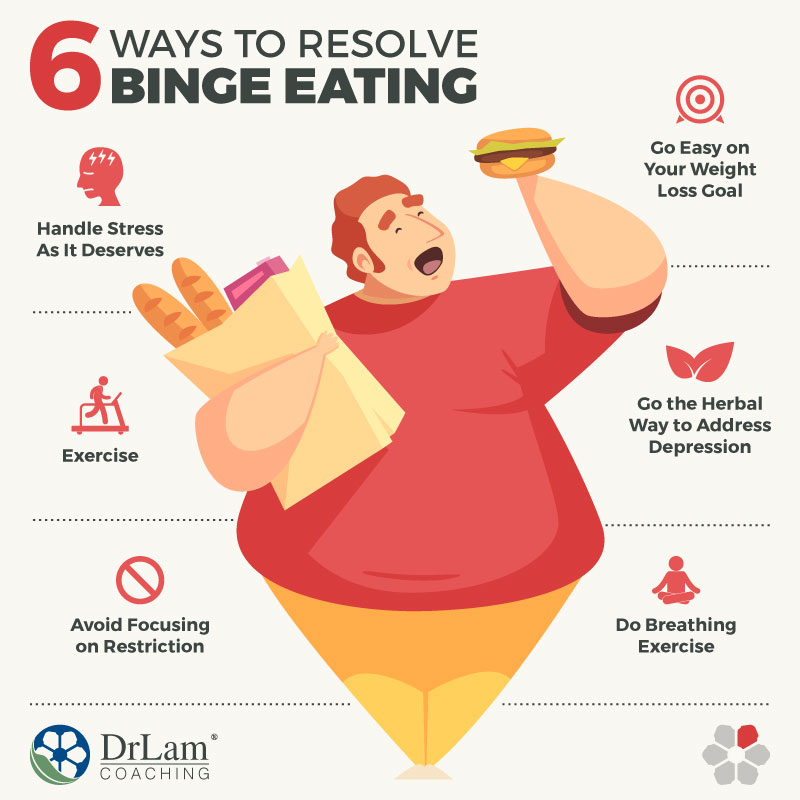Binge eating disorder, referred to as BED, is a common eating disorder characterized by compulsive overeating. However, not all compulsive overeaters suffer from the disorder. In BED, emotions influence your eating pattern and they are the important signs suggestive of the health condition. Studies show that women engage in binge eating more than men.
 Symptoms of BED include:
Symptoms of BED include:
If such eating continues for more than three weeks, the possibilities that you have BED are much higher. The severity of BED depends on how frequent your eating episodes are in a given week.
While one may have a severe BED, there may or may not be a weight gain.
While specific causes are not assigned to BED, factors such as genetics, emotional disturbances, and long-term dieting can increase the risk of BED.
If it is in your family history, the risk is higher as BED runs in the family. However, the decider can be your mental make-up as your emotional issues can more than double the risk of you becoming a binge eater due to genetic factors.
Long-term dieting can negatively impact you. Your goal to regulate your food intake can misfire as you tend to follow a highly restrictive diet that ultimately causes you to overeat resulting in binge eating.

BED, like most other disorders, can be alleviated by using a combination of treatments including therapy, herbs, yoga, and meditation. The most effective ways to balance BED include:
A common complaint associated with eating excessively is weight gain. Studies show that the tendency to seek professional help in reducing weight than binging is commonly found in those with BED. The more your concerns are about your weight gain, your anxiety, and binging increases.
Create a feasible diet plan that gives you your share of nutrients. On completing a week or 10 days of following the diet, treat yourself with your favorites that are not on your diet chart. This allows you to maintain a healthy diet while letting you indulge in other foods without guilt. No guilt means no stress. It is your day off, right? However, avoid overdoing it. To prevent binging on an off day, you can choose just one food out of the chart to have on a particular day. Thus, even on an off day, you are tuned to remain conscious of your food habits, with some concession of course.
While life gives you various reasons to be stressed, you have one most important reason to be stress-free and that is to preserve your health. Stress is one of the major contributors to BED. Stress can cause you to eat more. Stress triggers emotions that may overwhelm you and lead you to overeat. Binging takes your mind temporarily off your stress triggers.
Whenever you feel stressed, engage yourself in activities other than eating. You may go for a walk in your garden, listen to music, talk to people or engage yourself in a favorite hobby such as reading or singing.
Fixing your focus on restricting your diet can only lead you to eat more. Instead of listing the foods you need to avoid, think of foods that you can add to your diet for optimum health. Obsessed about avoiding certain foods may only result in you taking more of them. Focus on all the good foods that you can have and on the benefits of such healthy foods.
A state of depression often results in overeating. Certain herbs are highly effective in curing depression. Including them in your diet improves your mental strength, relaxes your mind and relieves depression. The herbs for depression include:

Using the above in herbal form or as essential oils benefit your mind thereby improving your eating habits.
Exercise, in any form, promotes your physical and mental health. Exercising improves your lifestyle and quality of life. Yoga, one of best physical and mental practices, is more than an exercise. It is an ancient art that promotes overall health. Practicing yoga not only improves your flexibility but also relieves you from addictions of every type. Yoga works in more than one way. It calms your mind, relieves stress and anxiety thereby reducing risk of eating disorders. Yoga promotes mindfulness. By improving your self-awareness, it helps you to follow a healthy lifestyle, which also means that binge eating is avoided.
Breathing exercises in yoga boost your health. Breathing techniques relieve stress, a trigger to eating more than required. Pranayama calms your mind, relieves anxiety and helps to handle stress better. Practicing pranayama regularly strengthens your mind and prevents you from succumbing to temptations.
Binge eating is also a symptom of adrenal fatigue. AFS, a disorder caused by poor functioning of adrenal glands, is often not diagnosed. AFS is a health condition with a group of symptoms including allergies, lethargy, fatigue and joint pain. Eating excessively beyond controllable levels and with more frequency is also suggestive of AFS. Depression, a symptom of AFS (and of many other health conditions too), is also interlinked with binging. Binging can cause depression and chronic stress which can lead to poor functioning of adrenal glands thereby causing AFS. According to studies, cortisol may also stimulate overeating in response to stress.
By regulating your food habits and coming out of binging, you can experience reductions in symptoms of AFS and improved health.
Binging can affect your NEM stress response. NeuroEndoMetabolic (NEM) stress response is your body's overall response to stress. Cortisol, produced by adrenal glands is an important stress hormone. Weak functioning of adrenal glands weakens NEM Stress Response.
Overeating, a symptom of AFS can also worsen adrenal function by causing depression. Following a healthy diet where binging has no place can improve your adrenal function as well as your NEM stress response.
Plan Your Meal - With a meal plan ready, there is little room for deviation. Of course, you have to follow your plan. Having a meal plan ensures you don't go without food for long thereby reducing the risk of binging. It also helps to resist triggers with ease.
 Maintain Food Journal - Writing down what you eat helps you to avoid binging and have healthy food instead. Looking at the entries in your food journal every night will help you assess if you have been really good to yourself throughout the day. It helps you to make healthy choices, makes you mindful of what you eat thereby preventing binge eating.
Maintain Food Journal - Writing down what you eat helps you to avoid binging and have healthy food instead. Looking at the entries in your food journal every night will help you assess if you have been really good to yourself throughout the day. It helps you to make healthy choices, makes you mindful of what you eat thereby preventing binge eating.
No Dieting Please - Sounds good, right? However, it is not to suggest you eat everything, it is only to recommend not to associate yourself with the concept of dieting, meaning strict dieting, causing you to feel deprived and most of the times, hungry. You sure know where the sense of deprivation with regards to food leads to.
Take the Weight off Your Mind - Binge eating makes you conscious of your weight gain. You may also be tempted to check your weight often, which, however, is not recommended. Checking your weight can adversely affect you. If you gained one or two pounds, you may feel stressed, which will lead to binging. Trust in your mind to understand your body better and stop checking weights.
No Room for Temptation - One of the most important reasons for binging is your temptation to eat more. Avoid storing instant foods in great quantities. Buy only as much as you will need in a day. Empty your cabinets and fridge off any junk foods so when you are tempted, you will have nothing to overeat. Giving in to temptations will only make you want more. Not responding to your temptation even if it is the lack of anything at home will make your body and mind get adapted to the situation thereby reducing your cravings for more.
Avoid Staying Up Late - Late nights are those times when you feel free to eat anything you want without being noticed by others who go to bed on time. These are also the times when you binge uncontrollably. Go to bed on time to prevent giving yourself such opportunities. You may not like the idea but remember you have a food journal to maintain.
 Eat Where You Have to - Apart from eating when and what you have to, you also need to eat where you have to. Having your food in front of your computer or television will make you eat beyond your required limits. Making this a habit will make you want to eat while watching television even if you have had a full meal a few minutes before. You may also not be mindful of what and how much you are eating. Hence, a place for everything is the rule.
Eat Where You Have to - Apart from eating when and what you have to, you also need to eat where you have to. Having your food in front of your computer or television will make you eat beyond your required limits. Making this a habit will make you want to eat while watching television even if you have had a full meal a few minutes before. You may also not be mindful of what and how much you are eating. Hence, a place for everything is the rule.
© Copyright 2018 Michael Lam, M.D. All Rights Reserved.
Binge eating is not the same as bulimia nervosa. In those with bulimia, excessive food intake is compensated by vomiting, fasting or by exercising, which is not the case with those who binge. Binge eaters tend to become obese.
